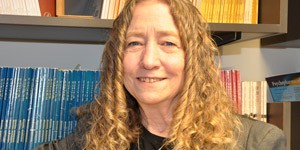By Bareket Scheiff Keren

Dr Bareket Scheiff Keren is an Israeli physician who has been pain specialist for nearly four decades. She has been a pioneer in the evolvement of medical cannabis in Israel. In addition to being a full-time practicing physician, she is actively involved in the professional and public debate, in both national and international levels, while she advocates for more access of patients to medical cannabis.
This series of chronicles describes the personal experience of a Medical Doctor who prescribes medical cannabis in his/her country. Each article is narrated in the first person and reports the subjective experience of each expert.
The current situation of medical cannabis in Israel
Israel was one of the pioneering states that provided access for people to use cannabis for their wellbeing. Cannabis has been, and still is, a forbidden substance in Israel since the times of the British mandate over Palestine. British law was adopted by the state of Israel from its foundation in 1948.
The first to seek aid with cannabis in Israel were the oncologists who, like their colleagues in the US, realised that cannabis can relieve the terrible side effects of chemotherapy, so cancer patients undergoing therapy were the first to receive special permission which then became an official license to use cannabis. This process began at the beginning of the 1990s.
I was exposed to the beneficial effects of cannabis at about that period by my patients.
As many pain doctors might have noticed, some patients never report any relief - on the contrary every treatment seems to cause side effects or worsen their situation. A young patient stepped into my clinic with pain originating from his cervical spine after he had been treated by the best clinicians in the country and declared "the only thing that relieves my pain and enables me to get some rest is cannabis."
This patient started my ever-lasting complicated relationship with the Israeli authorities – I realised that the patients must have a legal permit to use the forbidden substance. In those old days, I used to write to the director of the health ministry and the permit used to be for obtaining cannabis from any source up to 200 grams per month or growing up to six plants up to one meter high. The document would be a permit for one year signed by the director of the ministry and the attorney general of the Ministry for Health. As the numbers of users of cannabis for medical purposes grew, groups of specialists for cannabis growing and use started to organise. So inexperienced and debilitated patients could get relief with this special treatment. Although the organisations were completely voluntary and were defined as compassionate institutions.
Anyone could seek their advice and support for free.
At this point, the use of cannabis became a daily issue in government.
At the turn of the century, the Ministry for Health appointed a dedicated role to manage cannabis use permits – this role was defined as "The Nominated Manager for Dangerous and Forbidden Drugs in the State of Israel".
The manager started with issuing a list of "indications" for the use of medical cannabis as opposed to the notorious use of recreational cannabis, and the permits were changed to licenses. Anyone who had a permit for use had to apply for a license. The licenses were time and weight limited and were personal numbered documents. If lost, they had to be reported to the police.
A few people obtained a monopoly on growing medical cannabis for use by sick and needy patients.
Gradually, all those who had a permit to grow their own cannabis had to give it up and the only source for legal cannabis came from those privileged individuals who obtained the special growing franchise.
By the end of 2010, about 10,000 patients were legal cannabis users.
The "indications" for which a license could be obtained were:
- Patients with cancer under chemotherapy or radiotherapy
- Patients with severe neuropathic pain after trial of all other treatment modalities
- Inflammatory bowel disease after trial of all other treatment modalities
- Multiple sclerosis with spasticity
- Intractable epilepsy
- AIDS patients
At about this time, Israeli television showed a film by director Zach Klein, "Grass with the doctor's prescription" – which introduced the virtues of cannabis as a remedy to the wider public.
The public, already disappointed with conventional medicine, was turning to health providers to search for cannabis. The establishment panicked. Doctors had to place big signs on their office walls "No Cannabis Here".
The patients who received cannabis were considered privileged and sometimes felt that distributing it to their loved ones was doing them a big favour. Those who owned the monopoly to grow "the growers" were supposed to charge their clients only for their service so that cannabis was not sold as a merchandise according to the amount supplied but rather on a fixed price paid for as much as the patient needed. The price was agreed upon by the cannabis growers who gathered in an organised trade union group known as the Cannabis Growers Table.
Obtaining the title of a grower was highly profitable. It was granted under no special examination or proven knowledge, there were no known criteria to get the job and it was granted on the basis of personal connections. The individual growers developed their own cannabis strains and gave instructions to the patients who purchased the cannabis according to their own notions and beliefs. Neither the Ministry for Health nor the doctors or the care givers had any control over what the patients were taking.
Despite the situation, which was quite chaotic and had a lot of potential for misunderstanding and abuse, the cannabis supplies worked fairly well – patients did find the right strains to help them and remained with the grower who gave them the most satisfactory service.
However, the establishment was embarrassed and confused. The scientific questions as well as the medical questions were not answered.
- What is there in whatever the patients receive which they swear that saves them – that does the action?
- How can it be monitored?
- And above all, how can it be regulated?
As a response, Israel created a special body known as the "Israeli Cannabis Agency", which is a special office within the Ministry for Health whose mission is to regulate and monitor medical cannabis use in Israel.
Since there is very little established knowledge on cannabis as a whole and about its action as a treatment for disease other than patients' personal experiences, regulation is a very delicate and complex mission.
It is known that the plant has about 400 molecules that can play a role in the biology and function of the living organism and that there are endocannabinoids that are probably active in all human cells and tissues. Scientists and doctors acknowledge the fact that cannabis at this time is a treatment that is more of a trial for each individual patient. Worldwide experience with cannabis use has proven that it is very safe, which has led to allowing its use openly and freely and monitoring the results.
The most advisable method to monitor such a wide range of phenomena is big data collection from as many sources as possible. The worst method is to create rules that have no scientific grounds and to base a whole new layer of treatment on it.
The Israeli Cannabis Agency (ICA) operated in just the opposite way from the start; this is exactly what the ICA did.
They called the activity MEDICALISATIN.
The move was to ignore all the variety of strains in the plant and to divide all the strains in an arbitrary fashion according to their source (Sativa and Indica) and according to the TETRA HIDRO CANNABINOL and Cannabidiol percentage within the flowers.
This obviously does not benefit the patient who needs a strain with all the cannabinoid, flavonoid and terpene content, it is for the benefit of the pharmacy so that it does not have to deal with all the complexity of the plant but rather tend to have much less variety and a much easier a way to get the boxes from the drawer.
The so-called medicalisation is a process that makes the cannabis trade easier, more efficient and more worthy for the entire industrial process chain from the grower to the pharmacist.
The aim was not to provide patients the best solution to their problem but rather to make the industry more efficient and profitable to those who see the cannabis as GREEN GOLD.
This process, since it entailed moving the patients away from the grower, added many links to the cannabis marketing chain and made the end product much more expensive. It started to be sold the same as all other merchandise, according to weight and the popularity and availability of each strain.
The Israeli Medical cannabis market is undergoing a major shake up.
As a care giver, a doctor, I wish the process would have been just the opposite: I wish that patients could choose their strains, just as they do in Canada and California, and then study on a huge statistical scales which of the patients is choosing which strain, classify the strain and then define experienced-based solutions.
The situation as it is now in Israel is a complete disaster.
Since the ICA changed the system so that the patients buy cannabis in their pharmacies, the price has multiplied and there is no good quality cannabis anymore.
Patients applied to the supreme court to change the situation to the previous one and the supreme court ordered the ICA to withdraw to the previous method, although the changes are so vast that we are at a point of no return.
- There are about 60,000 patients with a license for medical cannabis in Israel.
- They can obtain cannabis in efflorescent form and as tinctures with fixed percentages of THC and CBD.
- There is a big shortage of cannabis in Israel and whatever is available undergoes radiation before marketing.
Patients are frustrated and desperate, and so am I.


